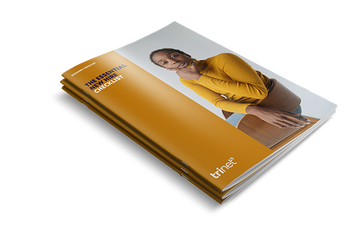
Table of contents
- 1.Hiring someone that is leaving on parental leave
- 2.Retaining your top talent
- 3.You’re intentionally closing the gender wage gap
- 4.If diversity is important to you, your actions will demonstrate your intent
- 5.Help build psychological safety
- 6.Have a plan in place
- 7.Training your managers on hiring practices
- 8.Encourage managers to support new employees in their planning
- 9.Make resources readily available
- 10.Know what constitutes discrimination
- 11.Normalizing pregnancy for current and incoming employees
- 12.Offer flexible schedules
- 13.Celebrate parents who take parental leave
- 14.Ensure your policies are inclusive
For many women, disclosing their pregnancy during the interview process can be stressful, and for good reason. Discrimination against pregnant women is still common in 2022. While the Pregnancy Discrimination Act protects women in the workplace, discrimination still exists. About 20% of women — 1 in 5 working mothers — say they were subjected to workplace pregnancy discrimination. The good news? The tide is turning, and hiring women who disclose they are pregnant during an interview is becoming more normalized. With viral LinkedIn posts like this one, women across social media have shared their experiences getting hired while they were pregnant. Considering women make up 44.7% of the global workplace, it’s likely that when hiring for your business, you'll come across top candidates that may choose to disclose their pregnancy.
Hiring someone that is leaving on parental leave
When a recruiter or hiring manager is trying to fill an important position, it can be difficult to hear that your top candidate will require parental leave shortly after starting. Their departure could impact your ability to fill the role and execute on essential tasks.
However, many benefits come from hiring someone who discloses their pregnancy early on in the hiring process. These include, but are not limited to:
Retaining your top talent
The Great Resignation and a looming skill shortage are both very real problems for employers in 2022. It’s more important than ever for companies to invest in potential employees that demonstrate interest and commitment. The more employers invest in these engaged individuals, the more loyalty they’ll receive. This will likely reduce turnover and help attract like-minded individuals to their organization.
You’re intentionally closing the gender wage gap
Workplace equality is significantly impacted when a woman's career takes a pause for maternity leave. When you hire women while they are pregnant, you help reduce this gap and allow them to still progress their careers while caring for their families.
If diversity is important to you, your actions will demonstrate your intent
You’ll show current and future employees that DEI is more than smoke and mirrors. 54% of business leaders say DEI is extremely important in their business, and Gen Z says the #1 factor they look for in a future employer is an inclusive workplace. People want to work where diversity is a real lived value.
Help build psychological safety
The benefits of psychologically safe teams have been well documented. These include:
- 27% reduction in turnover
- 74% less stress
- 57% more collaboration
When people feel they can bring their whole selves to work and don’t need to hide who they are, they feel more psychologically safe. Women who can be open with their managers about pregnancy feel a sense of security and relief in not having to hide this from anyone. Let’s discuss a few points to ensure that when a candidate does disclose their pregnancy to you early on, you’re acting in a way that is equitable, legal, and beneficial to both you and the candidates involved.
Have a plan in place
Rather than sounding surprised when someone discloses they are pregnant during an interview, plan for what you can say to create a positive candidate experience. This starts with:
Training your managers on hiring practices
Before sending your managers or leaders into an interview with potential hires, ensure they are set up for success with proper interview and bias training.
You should make it clear what kind of reactions, communications, and accommodations are appropriate when someone discloses they are pregnant. Remember, it is illegal to:
- Ask candidates about their family planning during an interview
- Rescind an offer because a candidate revealed that they are pregnant
- Judge a candidate based on anything other than their ability to do the job
Have all your employees trained on unconscious bias and pregnancy discrimination, so everyone knows the standards and expectations.
Encourage managers to support new employees in their planning
If you hire someone who discloses they are pregnant, managers can play an active role in supporting them (once they are onboarded into the company). For example:
- If the new hire will begin their leave in 4 months, make sure they understand how they can make the most impact within those 4 months.
- Create a plan to manage their workload while they are on leave.
- Help them organize the time-off required to attend doctor appointments.
Working through planning and questions the new hire may have collaboratively will make the transitions much smoother for all parties involved.
Make resources readily available
Employers can make it easier on current employees and potential candidates by having their parental leave policies listed clearly on their employer site and having the internal resources easily accessible. Many women report finding these resources within an organization can be difficult. Often, other employees end up being their champion and source of information, which adds to their already busy workload.
Know what constitutes discrimination
Despite the laws in place to protect women, there have been a reported 15,000 pregnancy discrimination claims filed in the US in the last 5 years. According to the EEOC, “Pregnancy discrimination involves treating a woman — whether a job applicant or an employee — unfavorably because of pregnancy, childbirth, or a medical condition related to pregnancy or childbirth.” It is also important to note that women do not legally need to disclose their pregnancy while going through the interview process. According to the equality and human rights commission, the following employment actions toward a pregnant woman are illegal:
- Offering a pregnant woman a temporary job until she starts maternity leave if you would have offered her a permanent position had she not been pregnant
- Asking whether they are pregnant or planning on having a family
- Revoking a job offer after you find out a woman is pregnant
- Treating any candidates unfavorably because they are pregnant
Normalizing pregnancy for current and incoming employees
Employers can help counteract the negative effect of pregnancy discrimination by normalizing pregnancy for all current and potential employees. Some suggestions to do this include:
Offer flexible schedules
This could mean allowing people to make their own schedule, implementing core hours, or switching to a 4-day workweek. Anything you do to enable flexibility will make it easier for parents to make their health appointments and care for their families.
Celebrate parents who take parental leave
Throw them a celebration. Make sure:
- They are set up for success when they get back so that taking leave doesn't become a burden or set them back in their careers
- There are appropriate spaces for women to pump when they return to work
Ensure your policies are inclusive
Do you have a PTO that allows parents to take time off for appointments? Do you have parental leave for both mom and dad? Can people work from home when required? These all contribute to inclusive workplaces that support parents. You want to hire the best person for the job. While the goal of any business is rooted in financials, there are other things to consider when hiring. Companies that value top talent, competencies, leadership contributions, and long-term commitment won’t shy away from hiring a pregnant woman.

Stacy Pollack
Table of contents
- 1.Hiring someone that is leaving on parental leave
- 2.Retaining your top talent
- 3.You’re intentionally closing the gender wage gap
- 4.If diversity is important to you, your actions will demonstrate your intent
- 5.Help build psychological safety
- 6.Have a plan in place
- 7.Training your managers on hiring practices
- 8.Encourage managers to support new employees in their planning
- 9.Make resources readily available
- 10.Know what constitutes discrimination
- 11.Normalizing pregnancy for current and incoming employees
- 12.Offer flexible schedules
- 13.Celebrate parents who take parental leave
- 14.Ensure your policies are inclusive






